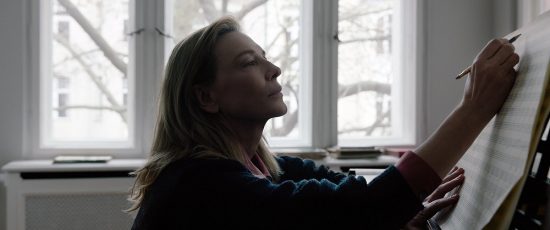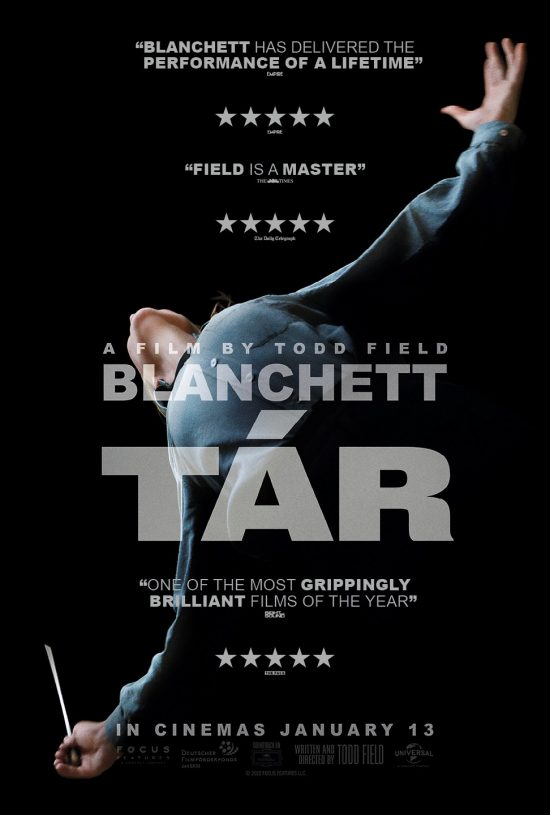TÁR asks a lot but delivers much more
To conclude, TÁR is one of the best movies ever made. Go watch it.
Perhaps the greatest delivery of meta text comes in an early scene in Todd Field’s new movie. Genius composer-conductor Lydia Tár (Cate Blanchett) casually delivers the phrase “me too” in conversation about career adversity. She is sat in a sumptuous dining room speaking to an acolyte, composer Eliot Caplan (Mark Strong). Everything to know about Lydia Tár lies in these two words. The mirth plays around her lips. She has no sympathy nor belief in what she says, having never put herself in a group with other people, she is more likely to say “me only”. And Lydia’s delivery implies that the ‘Me Too’ movement has no business existing. To cap the scene, Caplan agrees with and soothes her, as everyone around Tár has been conditioned to do. Strong is great. In fact, every actor delivers their best work throughout.
It’s clear that Field has thought long and hard about the construction of each moment of Tár. He recently revealed that the film includes upwards of 200 scenes. Take as an example, his decisions about Tár’s rhythm. It would hurt the ears and eyes of most composers. There are long one-take scenes with dense, complex dialogue as characters switch languages. Then come choppy insert shots that make little sense on first viewing. The film tosses off references to high-faluting people most have never heard of. And the soundscape is full of loud, jarring sounds then absolute silence. Screams and phone pings fight for space with choral snippets and puddle droplets. It’s visually arresting too. Most scenes are set in brutalist, banal but hyper-stylised buildings. Then Cinematographer Florian Hoffmeister’s stunning shot of a hangar at dawn punctuates the grey.
Another of Tár’s strengths is its layered storytelling. Almost every plot point remains open to interpretation. Field is unafraid of ambiguity nor of messing with point of view. His characters simper in one breath and slag with their next. This film feels so personal. Field is happy to alienate the audience so that they can experience Lydia Tár’s singular life. And every tic, brush or click stings like a wound. Luckily that’s followed by a sharp shock or a knowing giggle to melt away the anxiety.
Tár asks a lot of the viewer but delivers so much more in return. It is a beautiful, uncompromising and bold piece of art. It’s also a really entertaining movie, part satire and part noir. Although Field’s mentor was Stanley Kubrick, Tár feels more akin to European cinema. There are touches of Michel Haneke’s Happy End and straight homage to Andrei Tarkovsky’s work.
What the film is actually about is straightforward at first viewing. It tells the story of Lydia Tár’s fall from grace from a position of artistic untouchability. Lydia has it all: a marriage to first-chair violinist Sharon (Nina Hoss) and a loving daughter. Worldwide adoration comes from leading the Berlin Philharmonic, and she has an EGOT. Tár’s assistant Chesca (Noémie Merlant) benefits from a fund promoting female conductors so must pander to Lydia’s every whim. As does everyone. From Caplan to Sharon and assistant conductor Sebastian (Allan Corduner), even Tár’s Julliard students. Every relationship in Lydia’s life is transactional. Everyone protects her for they all have something to gain. Chesca begins to receive increasingly desperate emails from Krista, a former conducting fund recipient. Shortly after, a young female cellist (Sophie Kauer) auditions for the orchestra. These events are connected, and Lydia’s manicured life spectacularly unfurls. She sees and hears strange things and grows paranoid. Is anyone who they claim to be? The film ramps up intensity like a concerto’s refrain. The combined forces of the mysterious Krista, social media, envy and hubris all converge to bring Tár down. Did Lydia Tár learn something? Did anyone?
There’s so much more to Tár than simply one person’s story. It touches on the corrupting nature of technology, media manipulation and our obsession with fame. There’s dissection of inequity, white feminism, homophobia, intersectionality. The film is never unkind but lays out truths about youth and aging, of classicism, even video gaming. And the film’s beginning is as sublime as its end.
So many people say that they loved Tár. Me too.
TÁR opens in UK cinemas on 13th January 2023.











